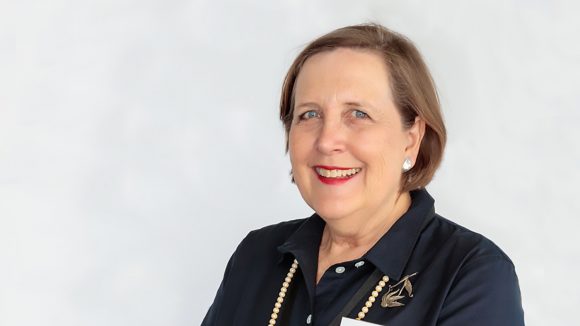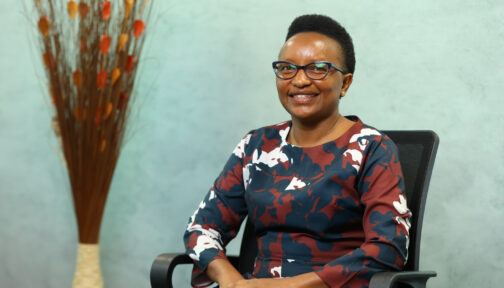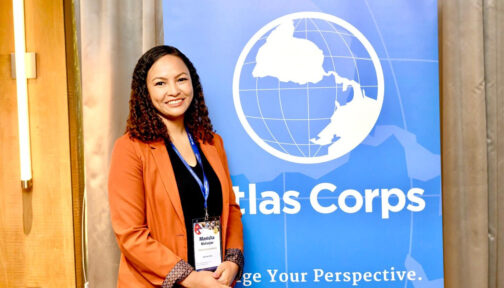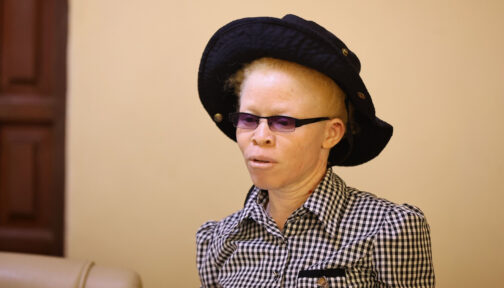Marie Schoeman has nearly thirty years’ experience in the field of inclusive education and worked as a technical adviser at Leonard Cheshire.
Marie’s activism was triggered as a parent of a child with Down syndrome in 1990s South Africa.
In 2020, she spoke to us about her hopes and motivations for the Inclusive Futures initiative across Bangladesh, Kenya, Nepal and Tanzania.
Marie’s story
“My interest in inclusive education goes back to South Africa in the late 1980s and early 1990s.
“At the time, I was an active campaigner for inclusive education. My son, who is now 33, was one of the first children with Down syndrome in a mainstream school. Through my activism as a parent concerned about his education, I learned about effective campaigning and making a difference. Nelson Mandela invited me to serve on the national commission for special needs and I became part of the process of developing inclusive education policy for South Africa.
“The 20 years or so I spent in the ministry of education brought about a lot of policy change, which I felt impacted on systemic change that could last longer than my presence in the department. I’ve been involved ever since! It was a steep learning curve in terms of understanding complex policy, but it prepared me for my work in government, and with the Inclusive Futures initiative today.”
Collaborative working
“I hope my experience can encourage us to collaborate. In my role as technical adviser, I hope the early childhood development project can benefit from that experience and we can encourage optimum collective working among the Inclusive Futures partners. All projects are currently in the inception phase, so I think my role will come into its own once the projects begin to roll out.
“I’m also technical adviser for the Tanzanian facet of the journey, looking at various models of inclusive education. Although Nepal is uncharted territory for Leonard Cheshire, through Inclusive Futures I’ve been fortunate enough to work there too. I’m still getting a handle on the existing policies and realities in the country, so I can make an informed contribution as the project progresses.
“I met the undersecretary for education in Nepal in 2019 and have already had valuable conversations with people from the ministry of education and disabled people’s organisations (DPOs). This is an important part of my job and a thread that runs through Leonard Cheshire’s work – opening dialogue and discourse between DPOs and with local and national government. It’s critical for us in this project to ensure we have the voices of people with disabilities at the forefront of what we do. I’m very excited about it – particularly that those voices are making inroads into changing how teachers are trained, which in turn will influence government policy on teacher education.”
Inclusive education in mainstream schools
“Inclusive education remains a misunderstood concept. It’s always a battle to lift inclusive education out of its ‘add on’ position. The same debates prevail, we have the same issues and people with disabilities are still fighting the same battles with governments.
“Many governments are currently struggling with their inclusive education policy. Across numerous countries, a ‘special needs’ perspective prevails and it’s hard to see how inclusive education can become part of planning and budgeting. But in low-income countries, inclusive education projects can, and do, provide opportunities for children with disabilities.
“At Leonard Cheshire, we’ve supported many children into mainstream education across Africa and Asia. Some of the graduates of our Girls’ Education Challenge Transition initiative (which also welcomes a small number of boys) in Kenya, have places at university and harbour ambitions which would be unimaginable without inclusive education.
“The project began in 2014 and has become recognised as best practice in the field. Spanning across the Lake District, with its hub in Kisumu, 108km north of Homa Bay, the Kenyan base of the Inclusive Futures project, our inclusive education team in Kisumu is multifaceted and experienced. Special educational needs (SEN) teachers, otherwise known as ‘beacon’ teachers, are trained on effective inclusive education classroom practice and also to spot signs of abuse. Social workers are experts in introducing children to inclusive education and keeping them safe in the system. Meanwhile, there is also a burgeoning network of ‘male mentors’, charged with changing attitudes towards disability in the community. Their voices resonate and are vital to the success of the project in the region.”
Changing education systems
“I’ve always been impressed by the way Leonard Cheshire drills into a whole region to make the system holistically inclusive – from conducting multi-sectoral educational assessments of children, to providing assistive technology in the classroom.
“Lives are being changed in Kenya through an increasingly robust system. I’m a big systems person. I hope that whatever I do will result in sustainable change. The inclusive girls’ education project is the perfect example of that and it’s with this experience in mind that we confidently add early childhood development and education into our Inclusive Futures work in Homa Bay. It’s a very small area, but when it upscales it’ll impact on how Kenya implements inclusive education across the whole country.
“Essentially, good teaching is at the core of quality education. Good teaching helps to make sure people reach their full potential. Inclusion is a respect for diversity and a respect for people vulnerable to exclusion. It’s also about making sure there is access to quality education for everyone and that they can participate in a meaningful way.
“I think it’s important to test how the government sees teachers dealing with inclusivity in ordinary schools. Although we won’t be dealing much with the special school sector, we will be drawing on their expertise in aspects such as braille training.”
Meaningful engagement is key
“We don’t want to make the same mistakes made before. I’m on the taskforce for the International Disability and Development Consortium (IDDC) for inclusive education, which works in partnership with the International Disability Alliance (IDA). Together, we’re providing as many opportunities as we can for people with disabilities to be heard; and to do that without repeating past mistakes, we need to look at all levels and viewpoints.
“We understand that there are different standpoints among organisations; for instance, the World Federation of the Deaf believes that the placement of deaf learners in mainstream schools does not support inclusion when it comes to sign language and bi-lingual needs.
“However, to make positive systemic changes, it’s critical to share ideas, reach a consensus, and respond to IDA so that the needs of all people with disabilities can be upheld. We need people with disabilities and their organisations at the forefront of the wider 2030 agenda.
“We have a recipe for success we can share. We are making inroads into quality mainstream education for everyone – Leonard Cheshire has a wealth of experience to share from our successful projects on the ground, and Inclusive Futures gives us an opportunity to innovate. But what’s fundamental, of course, is taking government with us. This must be a shared journey. It’s not just about successful implementation of inclusive education, it’s about learning from past failures, accepting where challenges lie, and finding out how we can address them to make solid and lasting changes.”

Marie Schoeman
Disability and inclusive education expert
Find out more about our inclusive education programme
Learn moreMore about our people

Mellen Marucha: “Our starting point must be ensuring parents understand and embrace inclusive education”
Mellen Kemunto Marucha is the senior programme coordinator at Sense International in Kenya – an Inclusive Futures partner working with and for people with complex and multiple disabilities to ensure they have the right to live, learn and thrive in an inclusive society.

Manisha Maharjan: “Inclusion benefits everyone, not just those directly impacted”
Manisha is project manager for Humanity & Inclusion and leads our education project in Nepal, funded by UK aid under Inclusive Futures.

Lucy Odwar: “Women with disabilities face many challenges”
Lucy is a director in the department of gender, social services and disability inclusion in Homabay County government. Through her work as part of the Homabay County Disability Forum, she supports the Global Labor Program – Inclusive Futures.